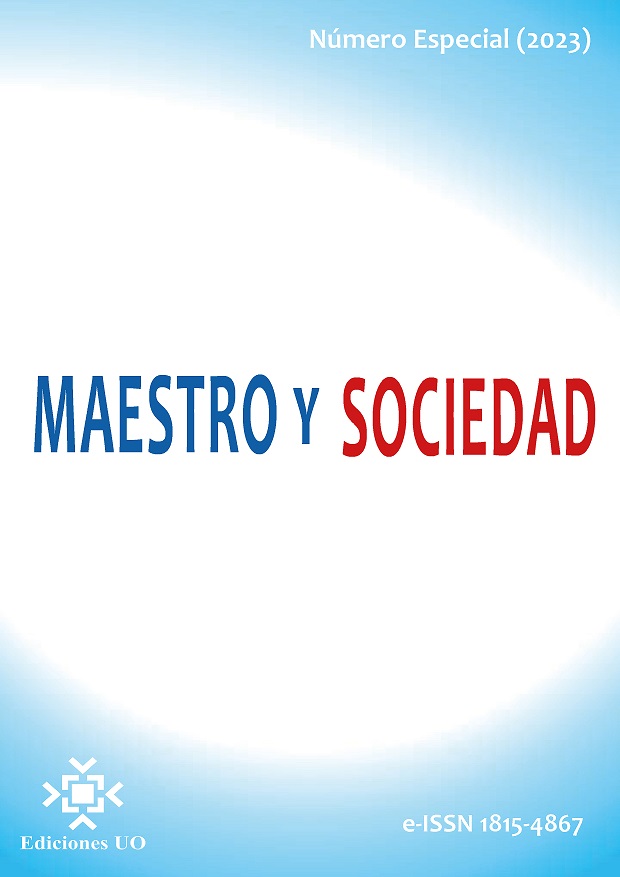Critical thinking incidence in the teaching and learning of language and literature in the Honorato Vásquez School
Keywords:
Education, constructivism, critical thinking, strategies, reflective, argumentative, readingAbstract
The purpose of this educational development project is to improve the teaching-learning process for the students of the "Honorato Vásquez" School through the Development of Critical Thinking in the area of Language and Literature; since, it allows students to access new knowledge in a reflective, argumentative, critical way. This critical thinking is achieved if their capacity for reflection, understanding and reasoning is increased in them, giving rise to new ideas, discovering intentions and adopting points of view in the face of reality. It is proposed to examine from a sociocultural perspective, the significance that today acquires the practice of a critical reading; and how their development should be oriented in students. Through the proposal raised in this project, it seeks to make teaching more interactive between teachers and students, thus making learning meaningful by being able to solve problems of everyday life. At the end, a didactic proposal is made of the actions and strategies that teachers have to promote for the mediation of experiences, which allow students to be trained as critical readers.
References
Avendaño, G. (2016). La lectura crítica en Educación Básica Secundaria y Media: la voz de los docentes. Cuadernos de Lingüística Hispánica, 28, 207-232.
Bezanilla-Albisua, M. J., Poblete-Ruiz, M., Fernández-Nogueira, D., Arranz-Turnes, S., & Campo-Carrasco, L. (2018). El pensamiento crítico desde la perspectiva de los docentes universitarios. Estudios pedagógicos (Valdivia), 44(1), 89-113.
Botero Carvajal, A., Alarcón, D. I., Palomino Angarita, D. M., & Jiménez Urrego, Ángela M. (2017). Pensamiento crítico, metacognición y aspectos motivacionales: una educación de calidad. Poiésis, 1(33), 85–103.
Callohuanca-Mamani, W. (2021). Importancia de la lectura crítico-reflexiva para promover el pensamiento crítico en estudiantes de educación básica. Maestro y Sociedad, 18(1), 326-334.
Chalá Arce, J. P., & Sangoquiza González, R. S. (2021). Desarrollo de los hábitos de estudio de acuerdo a la teoría del aprendizaje significativo de David Ausubel y Joseph Novak (Bachelor's thesis, Quito: UCE).
Deroncele-Acosta, A., Medina-Zuta (2021). Digital Competence, Role Stress and Engagement: Towards positive mental health in Latin American teachers. In 2021 XVI Latin American Conference on Learning Technologies (LACLO) (pp. 83-90). IEEE.
Deroncele-Acosta, A., Nagamine-Miyashiro, M., & Medina-Coronado, D. (2020). Desarrollo del pensamiento crítico. Maestro y Sociedad, 17(3), 532-546.
Ferreiro Díaz, L. (2017). (Co) educación afectivo-emocional y sexual, para despatriarcalizar la escuela y caminar hacia la igualdad. ATLÁNTICAS–Revista Internacional de Estudios Feministas, 2(1), 134-165.
Marrero, O. (2018). Habilidades blandas: Necesarias para la formación integral del estudiante universitario. Revista Científica Ecociencia, 18.
Muñoz, I. A., & de Miguel, C. R. (2017). Medida y evaluación de las creencias sobre la profesión de los maestros en formación. Revista Electrónica Interuniversitaria de Formación del Profesorado, 20(3), 79-91.
Núñez-López, S. N., Ávila-Palet, J. E., & Olivares-Olivares, S. L. (2017). El desarrollo del pensamiento crítico por medio del aprendizaje basado en problemas [The development of critical thinking abilities in university students by means of problem-based learning]. Revista Iberoamericana de Educación Superior, 8(23), 1-19.
Gómez Ortiz, M. L. & Pinto, N. J. (2021). Nuevas formas de estudio y gestión del tiempo escolar para la proyección de la formación profesional de los estudiantes de la media en la Escuela Normal Superior Pedro Justo Berrio del municipio de Santa Rosa de Osos
García, S. N. P. (2019). El desafío de la comprensión lectora en la educación primaria. Panorama, 13(24), 42-56
Júdex-Orcasitas, J. J., Borjas, M. P., & Torres Saldaña, E. S. (2019). Evaluación de las habilidades del pensamiento crítico con la mediación de las TIC, en contextos de educación media.
Jiménez, L., García, A. J., López-Cepero, J., & Saavedra, F. J. (2018). Evaluación de estrategias de aprendizaje mediante la escala ACRA abreviada para estudiantes universitarios. Revista de Psicodidáctica, 23(1), 63-69.
Published
How to Cite
Issue
Section
License
Copyright (c) 2023 Jenny del Rocío Bósquez Mestanza, Jamil Marcelo Mendoza Baquerizo, Narcisa Viviana Panchana Mosquera, Heidi Yumeri Ochoa Ponce

This work is licensed under a Creative Commons Attribution-NonCommercial-NoDerivatives 4.0 International License.
This journal provides immediate open access to its content, based on the principle that offering the public free access to research helps a greater global exchange of knowledge. Each author is responsible for the content of each of their articles.



























 Universidad de Oriente
Universidad de Oriente 